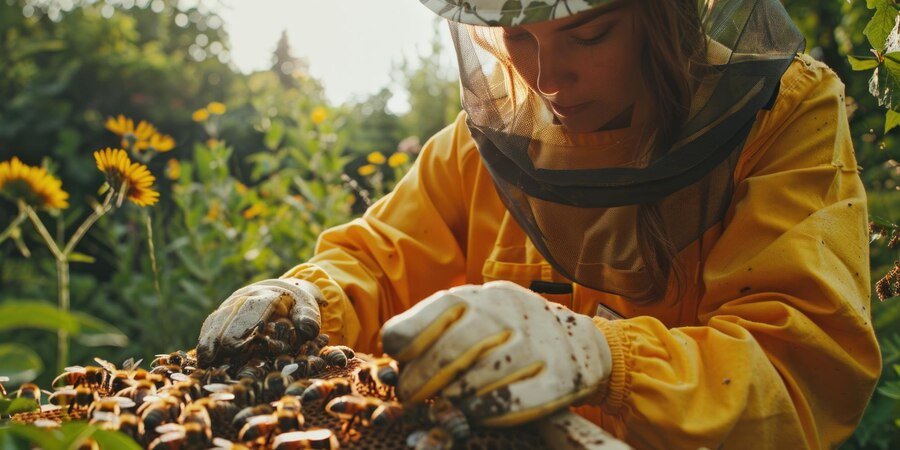The Importance of Bees for the Ecosystem and Our Food
Introduction
Bees are one of the fundamental pillars of our ecosystem and play a crucial role in food production. It is estimated that around 75% of the food crops we consume depend on some form of pollination, and bees are responsible for a significant part of this process. Without them, many fruits, vegetables, and nuts would become scarce, directly impacting our nutrition and health. In this article, we will explore the importance of bees, the threats they face, the impacts on agriculture, and how we can act to protect them.
The Role of Bees in the Ecosystem
Bees are, without a doubt, one of the most important species for the functioning of terrestrial ecosystems. They act as pollinators, a process that allows the transfer of pollen from one flower to another, enabling fertilization and the production of seeds and fruits. This activity ensures not only the survival of various plant species but also contributes to the maintenance of entire habitats.
About 90% of wild flowering plants depend on pollination to reproduce. Without bees, many ecosystems would collapse, directly affecting food chains. Species that rely on plants for shelter and food would suffer severe consequences, leading to a decline in global biodiversity.
Furthermore, by ensuring the genetic diversity of plants, the pollination carried out by bees strengthens ecosystems against diseases, climate change, and other environmental challenges. In other words, protecting bees means protecting life on Earth.
The Importance of Bees for Agriculture
Approximately 75% of global food crops depend, at least in part, on bee pollination. This means that a large portion of the foods we consume daily, such as fruits, vegetables, nuts, and grains, only exist thanks to the tireless work of these small insects. The Food and Agriculture Organization (FAO) estimates that pollination contributes billions of dollars annually to the global agricultural economy.
Crops such as apples, almonds, coffee, cocoa, and strawberries benefit directly from bee activity. Without them, agricultural production would drastically decrease and become significantly less efficient. Additionally, pollinated foods are rich in essential nutrients like vitamins, minerals, and antioxidants, contributing to healthy diets and disease prevention.
Beyond economic and nutritional benefits, pollination also has a positive environmental impact on agriculture. Farming systems that promote species diversity and bee-friendly habitats tend to be more resilient and sustainable. On the other hand, the decline in bee populations could lead to greater dependence on artificial pollination methods, increasing food production costs for farmers and consumers.
Threats to Bees: Causes of Population Decline
In recent years, bee populations have been experiencing a concerning decline. Several factors contribute to this crisis:
- Habitat Loss: Urbanization and intensive agriculture have reduced natural habitats, limiting foraging and nesting areas.
- Pesticide Use: The widespread use of pesticides, particularly neonicotinoids, has a devastating effect on bees, leading to direct mortality and impairing their navigation abilities.
- Climate Change: Global warming alters plant flowering seasons, affecting food availability for bees.
- Diseases and Parasites: The spread of diseases and parasites, such as the Varroa destructor mite, also contributes to bee population decline.
These threats not only affect bees but also have cascading effects on entire ecosystems.
Como Proteger as Abelhas
How to Protect Bees
Protecting bees is a shared responsibility between governments, farmers, and individuals. Actions to support bee conservation include:
- Reducing Pesticide Use: Implementing organic or integrated farming practices that minimize chemical use can help preserve bee populations.
- Preserving and Creating Habitats: Maintaining green spaces, planting native flowers, and establishing ecological corridors provide shelter and food for bees.
- Education and Awareness: Informing society about the importance of bees and the risks they face is essential to mobilize conservation efforts.
- Supporting Sustainable Agriculture: Promoting policies and practices that encourage biodiversity on farms creates a healthier environment for bees and other pollinators.
Impacts on Agriculture: Consequences of Bee Loss
The decline in bee populations has severe consequences for agriculture:
- Reduced Crop Yields: Less pollination leads to lower harvests, affecting food availability and increasing prices.
- Loss of Crop Diversity: Without bees, many fruit crops become unviable, reducing food variety and impacting human nutrition.
- Increased Dependence on Artificial Pollination: Farmers may have to rely on expensive artificial pollination methods, leading to higher production costs and potential environmental damage.
The loss of bees is not just an environmental issue; it is a global food security crisis.
Direct Benefits: Food Production and Bee Products
Pollination as a Pillar of Food Security
One of the greatest direct benefits provided by bees is pollination, which positively influences crop quantity, quality, and diversity. Around 75% of food crops rely on pollination, ensuring the availability of fruits, vegetables, nuts, and seeds rich in essential nutrients.
Bee pollination significantly enhances agricultural productivity, improving yield and quality in crops such as apples, mangoes, strawberries, squash, and broccoli. Without bees, there would be a dramatic reduction in the supply of these nutrient-rich foods.
Additionally, pollination promotes agricultural biodiversity, making crops more resistant to pests, diseases, and climate change, reducing the need for chemical fertilizers and pesticides.
Bee Products: Honey, Propolis, and More
Besides pollination, bees produce valuable natural products:
- Honey: A natural sweetener with antioxidant and antimicrobial properties.
- Propolis: A resinous substance with therapeutic benefits, strengthening the immune system and treating infections.
- Royal Jelly: A nutrient-rich supplement with proteins, vitamins, and amino acids.
- Beeswax: Used in cosmetics, candles, and skincare products.
These products benefit human health and support beekeepers and local economies.
Conclusion
Bees are essential for the balance of ecosystems and global food security. Protecting these pollinators is not just about conservation; it is a necessity for a healthy and sustainable future. By adopting practices that support bees, we contribute to a richer and more diverse environment. Let’s work together to preserve this natural treasure!







